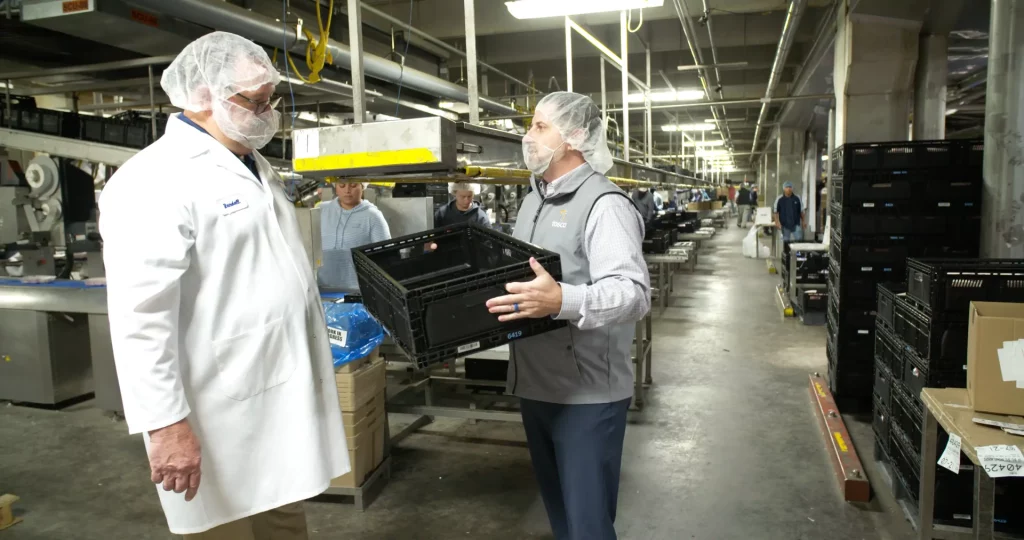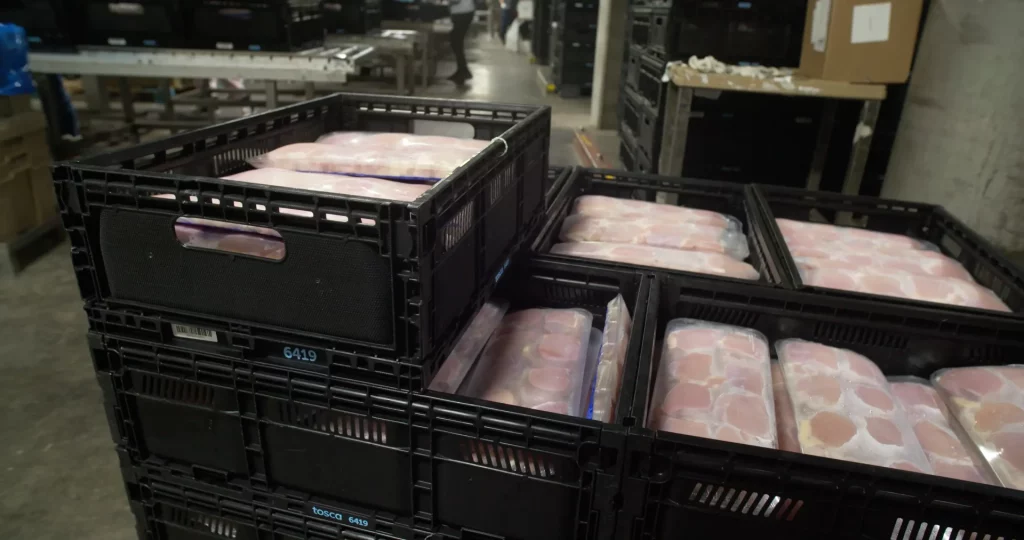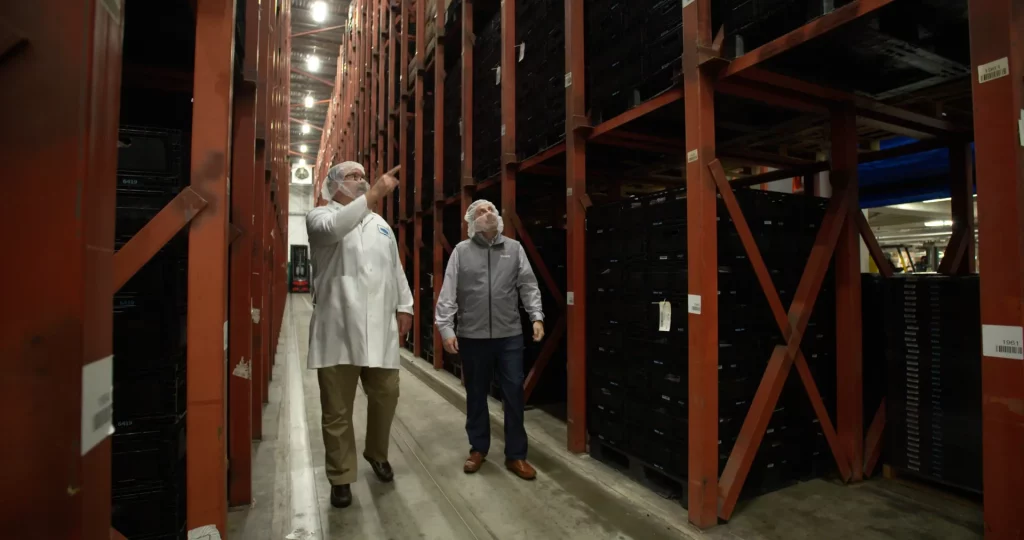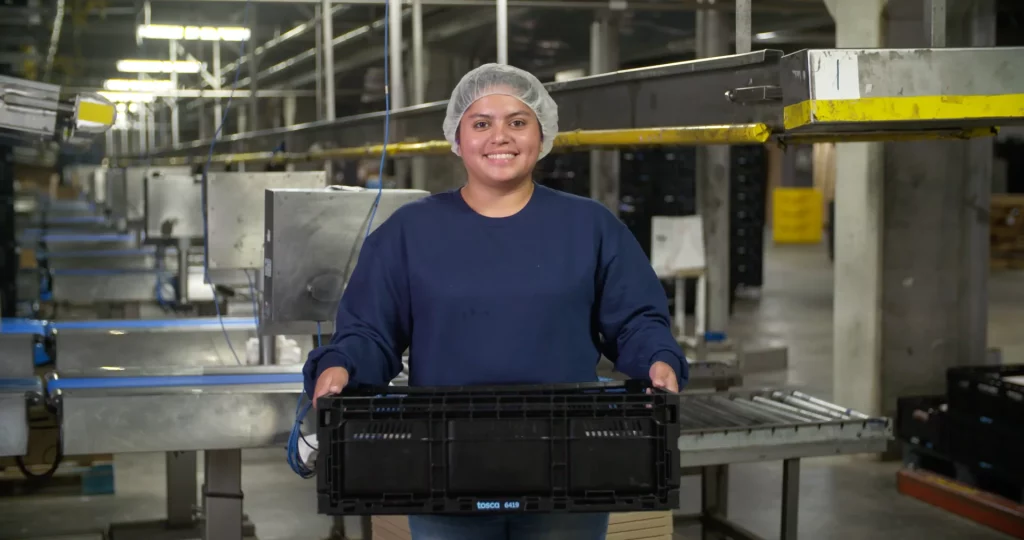Case Study: Fieldale Farms
Fieldale Farms had been transporting chicken in reusable plastic crates (RPCs) between its own facilities for several years, a change that was originally inspired by the opportunity to eliminate the cost and waste associated with transporting chicken in a single-use corrugated box.
Ever on the cutting edge of sustainability, Fieldale sought to duplicate the benefits of reusables outside of their facilities and looked for a way to use them when transporting their product to their grocery retail customers. They needed a solution that was sustainable, protective of their high-quality product, and cost-neutral.

Who is Fieldale Farms?
Operating since 1972, Fieldale Farms is a specialty poultry producer that was among the first companies to sell tray-pack chicken, kicking off a long-held reputation for defining the curve of progress and quality in the poultry industry.
Today, they are known for their antibiotic-free, all vegetarian fed, American Humane Certified™, and Non-GMO Project Verified chicken brand Springer Mountain Farms. Springer Mountain Farms is a household name that has come to define what premium, sustainable chicken means to poultry consumers all over the east coast. Not only is Springer Mountain Farms’ chicken highly sought after in retail, but it is also the only chicken brand that is listed on restaurant menus all over the country.
After researching alternatives to one-way packaging, Fieldale discovered that Tosca was the only pooler that offered a reusable pooled solution to transport poultry. Soon they began transporting many of their shipments in Tosca RPCs.
“But now, every customer is demanding that all their suppliers be sustainable. There are many, many interpretations of what that term means, but from our perspective, it’s leave the planet better than you found it. Consume fewer resources, consume less water, less electricity, less trees. Our goal really is to never use a landfill. That’s very hard to realize, but using Tosca totes have sent us a lot further down that road.”
Tom Hensley, President of Fieldale Farms
Tosca’s pooled RPCs enable Fieldale to distribute their poultry in a more sustainable manner, without any added cost and in a way that reduces time and labor. RPCs from Tosca always arrive ready to go, having been cleaned and maintained to the highest packaging food safety standard, ISO 22000. Fieldale can move packaged poultry within their packaging plant in RPCs and place them directly on trucks headed to the distribution facilities of their retail customers. The stronger RPC also protects product better than corrugated. Jeff Paschall, VP of Sales and Marketing at Fieldale put it best: “When we put our premium Springer Mountain products in the Tosca RPC, it allows us to deliver that product to the consumer exactly the way it left our facility, and that’s what it’s all about.”

Our customers are always looking for the next best thing, and Tosca allowed us to deliver that to them… Any time you work with somebody, you want to work with good people that make the process easy and manageable, and that’s what Tosca has been able to do for us. We’ve been able to go to our customers and say, “look what we can do for you.” We can help the environment and we can do things that match all of our sustainability goals, not just ours but our retailers.”
Brad Moore, Retail Sales Manager at Fieldale
Since the adoption of Tosca’s pooled RPCs, Fieldale has noticed a significant reduction in labor and environmental impact in their day-to-day operations.
Fieldale has also noticed benefits that directly impact their customers, enabling them a competitive edge over other poultry processors. For example, the use of a stronger box has translated directly to significant labor savings by way of reducing the number of boxes that need to be handled. Since RPCs are strong enough to carry more products without breaking, Fieldale is able to send the same amount of chicken in fewer boxes. It is estimated that this upgrade reduces 500 packages per truck from the process, translating to 24% fewer boxes that need to be handled in the customer’s distribution centers. With advantages like this, Fieldale can be a better partner for their retail customers.
The sustainability impact is significant as well. Not only is over 1.5 pounds of corrugated eliminated with every use of an RPC, translating to millions of tons of corrugated diverted from entering the supply chain every year, adopting RPCs has translated directly to a reduction of greenhouse gas emissions. A life cycle analysis revealed that in the supply chain between Fieldale and one of their retail partners, there is an 80%+ GHG reduction estimated over the course of 10 years. It is also estimated that over 143 million gallons of water will be saved.*
“I think we can always say we want to be green and we want to reduce our carbon footprint, but in the end, it needs to work. In this case, it works for all of us: the warehouse, the individual stores, and us.”
Brad Moore, Retail Sales Manager at Fieldale

The process of a successful adoption of RPCs is a three-legged stool for each supply chain – Tosca, Fieldale, and Fieldale’s customer all must play a part. Fieldale is a powerful advocate for the adoption of RPCs and has been working on converting as many of their retail supply chains as possible to RPCs ever since.
“It’s important to us to deliver real value to our customers every single day, and Tosca has been able to allow us to do that.”
Jeff Paschall, VP of Sales at Fieldale

*Tosca works with Trayak and their compass LCA tool to determine the impact of RPCs verses single use corrugated. The Compass LCA tool is endorsed by the Sustainable Packaging Coalition.


